
|
Editing Reverend
Wright’s Wrongs By Tim Graham
Executive Summary |
PDF Version
I. INTRODUCTION.
By that standard, inspirational figures in Obama’s biography should have been serious subjects of media scrutiny, including Obama’s self-described spiritual mentor, Reverend Jeremiah Wright. In his 1995 autobiography Dreams From My Father, Obama describes the feeling he had when he heard Wright preach, a powerful revelation that changed his life story: "I imagined the stories of ordinary black people merging with the stories of David and Goliath, Moses and Pharaoh, the Christians in the lion's den, Ezekiel’s field of dry bones. Those stories – of survival, and freedom, and hope – became our story, my story." At the age of 27, inspired by Reverend Wright, he became a Christian. But what kind of church was Obama choosing? What did Obama’s long membership in the church say about his faith and his views on race and America’s place in the world? For more than a year on the campaign trail, the nation’s traditional broadcast TV networks found that a story not worth exploring in any depth. Then in mid-March, ABC uncovered Rev. Wright’s noxious recorded sermons suggesting that America deserved 9/11 and that the federal government created AIDS as a tool of black genocide. They were not difficult to find: the church sold the sermons on DVD. The vicious, screaming lectures were widely viewed on YouTube and discussed on talk radio and cable TV. The media narrative didn’t scrutinize Obama’s faith, but quickly synchronized with the Obama campaign line that the virulent video clips unfairly caricatured the minister (and by association, Obama himself.) PBS star Bill Moyers lamented that Wright was "assassinated by soundbites." Few journalists turned the question around and wondered if America was being unfairly caricatured and if Obama was too tolerant of the most vicious negative campaigning? Did the nation’s broadcast networks really play Wright’s remarks to excess? A Media Research Center study of ABC, CBS, and NBC news broadcasts from the beginning of the Obama campaign on February 10, 2007 through July 15 reveals that a viewer watching only broadcast TV news would have received a much more limited (and even censored) version of Wright’s sermons. The networks largely restricted guest lists on the subject to liberals and media professionals. The networks all handed over large gobs of time to candidate Obama on March 18 and 19 when he addressed Reverend Wright in a "race speech" hailed as "brilliant," "extraordinary" and "another great eloquent speech." This study does not focus on the entirety of the broadcast networks’ Obama coverage in this period of controversy. It focuses instead on a more concentrated question of how the campaign interpreted the sermons of Reverend Wright and tried to minimize their impact. Analysts focused on stories citing Reverend Wright by name, with special attention to stories which used his soundbites. What analysts found was a set of networks who were engaged not in a mission to investigate Obama’s biography, but on a mission to protect Obama’s political viability. It could not be argued that the Reverend Wright story wasn’t covered. But it was covered within the confines of a Democratic primary campaign. While it led to pundits wondering on air if Obama had a problem with white, working-class voters, the networks largely kept the squabble "in the family" and did not easily allow Republican critics of Obama to participate. Democratic candidates did not make Wright an issue before the media discovered it. For her part, Hillary Clinton waited for the media to introduce the topic, and then waited weeks more to declare that she would have acted differently than Obama and left the church over Wright’s incendiary remarks. Throughout this electoral cycle, as media pundits have celebrated Obama’s faith instead of scrutinizing it, glorified his fluency in challenging the religious right by discussing faith in the political realm, offering Democrats a chance to close a "God gap," the networks waited until almost the entire Democratic electorate had voted to wonder what kind of substance was filling the "God gap" in Obama’s own mind and heart. From the substance of Wright’s sermons, that gap was filled with hatred for America, unrepentant bitterness about racial divisions, and deep suspicion of an evil empire of a government Obama professed himself willing and ready to lead.
II. WHERE’S REVEREND WRIGHT? In the current election cycle, Reverend Wright first arrived in the national spotlight on Fox News Channel’s Hannity & Colmes back on March 1, 2007, when Sean Hannity broached the issue of Trinity’s dedication to a "black value system." Rev. Wright scorned Hannity as a neophyte who’d never read the masterworks of "black liberation theology." But it took an entire year for Reverend Wright’s name to emerge on the broadcast networks.There were other opportunities to broach the issue. Five days later, The New York Times reported that Obama disinvited Rev. Wright from offering a planned invocation at his campaign announcement on February 10, 2007 due to "the campaign’s apparent fear of criticism over Mr. Wright’s teachings, which some say are overly Afrocentric to the point of excluding whites." ABC’s Jake Tapper mentioned the controversy in passing on the February 11, 2007 World News Sunday: "His foreign-policy views are just one target for Obama’s critics, who have questions for the senator about any number of issues, including whether his church here on Chicago’s South Side, which expresses a message of black power, is too militant for mainstream America to accept." On January 15, 2008, Washington Post columnist Richard Cohen wrote a column decrying how Trinity’s magazine The Trumpet fulsomely praised Rev. Farrakhan. Obama’s campaign issued a statement from the candidate. "I decry racism and anti-Semitism in every form and strongly condemn the anti-Semitic statements made by Minister Farrakhan," Obama said in the statement. "I assume that Trumpet magazine made its own decision to honor Farrakhan based on his efforts to rehabilitate ex-offenders, but it is not a decision with which I agree." But the name of Jeremiah Wright didn’t surface on the Big Three networks until CBS first broached it on February 28. In campaign terms, it was very late in the fast-forward primary process, after 36 states and the District of Columbia had held primaries or caucuses. John Edwards had suspended his campaign almost a month earlier. The first story with Wright sermon soundbites aired weeks later, on ABC’s Good Morning America in mid-March, after another six contests. Before that, Obama’s church and minister were barely mentioned – and usually as an Obama defense mechanism. ABC's Jake Tapper offered Obama’s church-and-minister defense twice in November and December – but never with a whisper of the name of Reverend Wright. On ABC's World News with Charles Gibson on November 16, Tapper offered a generic story on negative phone calls and e-mails, including suggestions Obama was a Muslim. Obama said: "There are a variety of nasty e-mails going out. This is similar to the e-mails that’s, e-mails that have been floating around that says I am, you know, I’m a Muslim plant who’s planning to take over America, you know? This would surprise my pastor at Trinity United Church of Christ." On November 19, Tapper repeated a version of that on Good Morning America. Tapper also replayed Obama’s "Muslim plant" joke on the December 5 Nightline. When Dean Reynolds first broached the controversy on CBS, devoting about a minute to it on February 28 CBS Evening News, he brought up Farrakhan, the point of Cohen’s column from six weeks earlier: "Obama has said the church’s former pastor and his spiritual mentor, Jeremiah Wright, is like an old uncle who sometimes will say things I don’t agree with. Among Wright’s pronouncements, that racism is how this country was founded and how this country is still run. A church-related publication saluted Nation of Islam Minister Louis Farrakhan, a well known anti-Semite, who in turn has praised Obama's candidacy as recently as last Sunday."
III. THE SERMONS ERUPT. The Wright-sermon story really broke open on television with Brian Ross on the March 13 Good Morning America. Employing clips of Wright sermons that were available on DVDs sold by the church, Ross revealed several shocking pulpit outbursts from Wright:
ABC tried to balance this hard-hitting report by bringing in Obama campaign religion adviser Shaun Casey for an interview with anchorman Chris Cuomo. Cuomo asked if Obama would disassociate himself from Rev. Wright, and Casey quickly began accusing the media of singling Obama out: "I mean, it's interesting to me you haven’t vetted Hillary Clinton’s pastor’s sermons. You haven’t vetted President Bush’s pastor’s sermons. You haven’t vetted John McCain’s pastor’s sermons. So, you’re not holding them to that standard, which I think is very interesting." The network coverage that followed was quite sensitive to the idea
that Obama was unfairly singled out on this story. A day later, Obama
put out a statement condemning the featured
Snippets of Wright’s sermons drew only 72 seconds of evening-news coverage in all of March, or an average of 24 seconds per network, less than one commercial.
The second most common soundbite was Wright suggesting "Hillary ain’t never been called a ni**er." (The word was always bleeped.) That was aired once on each network’s evening newscast, and four times on the morning programs. Wright’s most outrageous comments about 9/11 being "America’s chickens coming home to roost" were spiked by all three evening shows, as well as by CBS’s The Early Show. None of the network shows aired Wright’s soundbite on how governments lie and how the federal government hid the truth about "inventing the HIV virus as a means of genocide against people of color." (It came on April 13, 2003, in the same sermon in which Wright yelled "God damn America.") CBS analyst Jeff Greenfield decried it on the CBS Evening News on March 18, hours after Sen. Obama’s speech on Wright and race. "How does a guy who spent 20 years with somebody with some notions that seem very bizarre – like AIDS is a government conspiracy – what’s he doing with that guy for 20 years?" He said the speech itself would not end the controversy. The next morning on The Early Show, he repeated that critique, saying of Wright’s AIDS claim, "these are the words of a crackpot." When the networks weren’t spiking the worst soundbites, reporters tried to minimize how many people would find them offensive. CBS’s Byron Pitts even claimed that Wright’s speeches were only regarded by some people as anti-American. On the March 18 Early Show, directly after a "God damn America" clip, Pitts suggested these Wright remarks were merely "comments critics have called anti-American and anti-white."
IV. THE RACE SPEECH CELEBRATION The evening news shows on March 18 carried almost six minutes (348 seconds) of snippets from the Obama speech (or roughly five times more than the Wright bites). The morning shows carried roughly nine and a half minutes (572 seconds) of sound from the speech, led by CBS, who set aside six and a half minutes for viewers to enjoy. That total was nearly twice as much time as the 297 seconds the network morning shows devoted to Wright soundbites in the entire month of March. CBS Early Show co-host Maggie Rodriguez oozed: "It’s being called a defining cultural moment in America. Barack Obama speaks about America’s racial stalemate, a moving moment, a political risk."After decades of media scholars complaining about the way the networks have miniaturized soundbites to seven or eight seconds in length, the networks let Obama speak in a soundbites that lasted a minute or more. They attempted to add gravity to the remarks by placing still photographs over his remarks, including stills of an admiring Michelle in the audience and old photos of his childhood featuring his parents and grandparents.
The controversy was described as unfortunate, and Wright’s rants were a scandal only to some Americans. On NBC Nightly News, anchor Brian Williams began sympathetically: "This country is currently feeling its way through something entirely new. This is the first time an African-American candidate has a serious, some would say likely, shot at becoming the next President of the United States. So race is an issue in this year’s campaign, both in a way that's inescapable and in other ways. The latest controversy has to do with a Chicago minister. He’s made some comments some find highly objectionable, and he happens to be Barack Obama's former minister." In the beginning seconds of the CBS Evening News, anchor Katie Couric highlighted Obama’s refusal to disown Wright: "Barack Obama addresses the controversial comments of his pastor, condemning the words but not the man," followed by an Obama clip: "I can no more disown him than I can disown the black community." On ABC, Obama’s refusal to disown Wright was cast as a magnanimous, even heroic gesture. George Stephanopoulos declared, "By refusing to renounce Reverend Wright, that was in many ways an act of honor for Senator Obama." The next morning, Stephanopoulos oozed, "I think it was a stunning success, as a speech. It was sophisticated, eloquent. Barack Obama is as a fine a writer as you’ll find in a politician." ABC’s Robin Roberts announced the results of a poll that found "65 percent of voters said Reverend Wright’s comments made no difference in the way they view Obama." Stephanopoulos praised Obama’s courage again: "He did not renounce someone that he was under great pressure to renounce, even though he disagreed with his comments. And I think a lot of voters, even if they’re uncomfortable with Reverend Wright, will respect Barack Obama for that act." Stephanopoulos also singled out Obama for his great honesty: "I think the other intangible here is how voters will respond, not only to the honesty that Barack Obama showed yesterday, not only the sophistication he showed in the speech, but also the honor that he showed." ABC reporter Terry Moran also saw honesty: "Well, as you know, one of the hardest things to do in American politics, in American society, is to talk honestly about race. And it’s clear that’s what Barack Obama was trying to do in that remarkable speech."
V. GUEST LIST TILT. 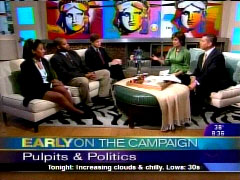 Broadcast network interview segments on the Wright remarks and Obama’s
race speech in March were dominated by liberal guests. When the networks
allowed Republican or conservative guests, they praised Obama’s remarks.
CBS especially loaded its reaction panels with nine liberals and just
one right-leaning pundit, pollster Frank Luntz, who contained his
remarks to grading Obama’s stagecraft. NBC allowed six liberals to three
conservatives, including MSNBC’s Chris Matthews and Joe Scarborough. ABC
offered conservative Peggy Noonan and liberal Donna Brazile one appearance each. In both
interviews, they were paired with NPR’s Juan Williams, who was more
critical of Wright than both women. Overall, the pundit count was 16 to
5. Broadcast network interview segments on the Wright remarks and Obama’s
race speech in March were dominated by liberal guests. When the networks
allowed Republican or conservative guests, they praised Obama’s remarks.
CBS especially loaded its reaction panels with nine liberals and just
one right-leaning pundit, pollster Frank Luntz, who contained his
remarks to grading Obama’s stagecraft. NBC allowed six liberals to three
conservatives, including MSNBC’s Chris Matthews and Joe Scarborough. ABC
offered conservative Peggy Noonan and liberal Donna Brazile one appearance each. In both
interviews, they were paired with NPR’s Juan Williams, who was more
critical of Wright than both women. Overall, the pundit count was 16 to
5.
This guest count does not include the actual staff analysts of the networks in March, like ABC’s George Stephanopoulos, NBC’s Tim Russert, or CBS’s Jeff Greenfield. But only Greenfield appeared on a panel with other pundits. It also doesn’t include officially designated campaign spokesmen, like Shaun Casey’s aforementioned defense of Obama on ABC right after the first Brian Ross exposť. CBS was the most eager network to book guests supportive of both Obama and Wright. On the March 17 Early Show, CBS interviewed Rev. Calvin Butts, who announced to anchor Russ Mitchell that he was "very close" to Wright and proclaimed that black churchgoers should never denounce their pastors for radical pulpit rhetoric, since it’s "the practical application of the love of God to everybody." From there, CBS moved on to a three-liberal panel of guests: Debra Dickerson of the hard-left magazine Mother Jones, liberal Columbia professor Randall Balmer, and Bucknell professor and "hip hop scholar" James Peterson. CBS’s Maggie Rodriguez asked if Wright had crossed any lines in his statements, and Peterson announced: "I don’t think so." Rodriguez wondered if Obama should be seen as "guilty by association" with Wright, Balmer said "I don’t think so...that’s just not a fair thing." On the March 18 Early Show, CBS offered liberal commentator Nancy Giles and Democratic consultant Joe Trippi. Rodriguez asked, "How careful does he have to be today not to denounce Jeremiah Wright and make black voters angry?" Russ Mitchell added this hopeful question to the liberal pair: "After the speech today, is the race and gender issue over?"
On the March 19 Early Show, CBS turned to Greenfield and right-leaning pollster Frank Luntz for analysis. Luntz only discussed Obama’s speechmaking technique, that he looked too much into the tele-prompter instead of connecting visually with the audience. Greenfield repeated his critique of Wright’s AIDS theories. Rodriguez began the segment: "Consensus seems to be that this was yet another great, eloquent speech by Barack Obama." CBS also interviewed Time managing editor Rick Stengel and (for a third time) Debra Dickerson of Mother Jones, who declared the speech was "brilliant" and "visionary." Stengel weirdly declared "It’s kind of amazing we’re reckoning with the fact, wow, we actually have a black candidate running for president." Not every liberal spared Reverend Wright (see box), but most did. On March 15, NBC interviewed radical professor and Obama supporter Michael Eric Dyson and Melinda Henneberger of the liberal Huffington Post website. Dyson dismissed Wright’s "so-called inflammatory remarks," and Henneberger claimed "I actually think it might turn out to be a positive for Obama in a funny way, because it completely puts to rest this motion that he’s a secret Muslim." So much for a debate. Some conservative pundits tried to be non-committal. On the March 18 NBC Nightly News, Joe Scarborough tried to reserve judgment on the Obama speech’s impact, saying reactions in the news studios weren’t as important as reactions among Reagan Democrats in industrial towns. NBC’s other pundit in that segment, Washington Post editorial writer Jonathan Capehart, swooned over the speech, calling it "a very important gift the Senator has given the country." By March 21, Scarborough was telling Today viewers it was "the most important speech on race since Martin Luther King’s ‘I Have a Dream’ speech." On the March 20 Today, NBC brought back Dyson again, and paired him with right-leaning Michael Smerconish, who condemned his own talk-show listeners for being skeptical of the Obama speech: "You get an impression when you watch YouTube for 10 seconds. The speech requires an investment of time. But I maintained if you make that investment of time, it removes this issue...he addressed in a very unmuzzled fashion the questions that I and a lot of other members of white America had about this problem." When Lauer asked Dyson if Obama "went after the speech from a candidate who happens to be black to a black candidate," Dyson replied: "Well, of course not, because in America one is punished for being conscious of the racial restrictions that have been imposed historically, and yet when one seeks to move beyond them, one is ever trapped by them." NBC also interviewed leftist Air America host Rachel Maddow on the morning of March 22.
A few minutes later, as they continued the interview in the 7:30 half hour, Noonan added that Obama helped himself by refusing to disassociate with Wright: "I’ve got to tell you, in American politics, there’s too much throwing people over the side. ‘You said a bad thing, you’re out of here. You said a bad thing, you’re done.’ He [Obama] said [of Wright], ‘he said a bad thing, there are reasons, you’re wrong, let’s go forward together.’ I like that better." Only Newt Gingrich on ABC offered one hard-hitting conservative critique a month later, on the April 29 Good Morning America, in an interview largely about other matters with substitute host Barbara Walters. Gingrich said "I think Reverend Wright’s a very angry person. I think he’s actually more reflective, as is William Ayers, of the hard left than he is of African-Americans. And I think he represents a very, very hardline anti-American viewpoint."
VI. REVEREND WRIGHT RE-EMERGES.
Without these events, the Wright story would have been left in a quiet corner. But Wright’s speaking tour spurred greater coverage. In the last week of April, the networks increased their time devoted to Wright soundbites: 286 seconds on the evening news and 351 seconds in the morning. While both these totals fell below the amount of seconds the networks gave in their promotional treatment of Obama’s race speech, Wright snippets drew about four times as much time on the evening shows in April as the Wright soundbite total in March. Wright soundbites amounted to almost a minute more time in April than they did in March on the morning programs. Although the media played along with the Obama campaign spin that Wright’s beliefs had been caricatured, when Wright was pressed harder on his most outrageous statements at the National Press Club, he refused to back down from any of his claims about the evils committed by America – including that the "terrorism" of the United States caused 9/11, and that the government conspired to infect blacks with AIDS. Wright’s National Press Club vitriol demonstrated his positions were not being exaggerated, but his reiteration of his opinions about an AIDS conspiracy and America deserving 9/11 went virtually unreported. Three of the shows featured clips of Wright suggesting America had committed terrorism (ABC’s Good Morning America, CBS Evening News, and NBC Nightly News), adding up to 23 seconds. They each used slightly differing versions of this quote: "Jesus said ‘do unto others as you would have them do unto you.’ You cannot do terrorism on other people and expect it never to come back on you. Those are biblical principles, not Jeremiah Wright bombastic, divisive principles." None of the networks showed Wright defending his conspiracy theory on AIDS, citing a book by Leonard Horowitz that charges both AIDS and the Ebola virus were U.S. government conspiracies. But on the April 29 World News, ABC suddenly featured Obama denouncing "Such ridiculous propositions as the U.S. government somehow being involved in AIDS." That was a first for ABC, which had never informed their audience of this conspiracy theory. A numerical breakdown of the soundbites shows that much of the April soundbite time was devoted to soundbites from an hour-long softball interview of Wright by Bill Moyers on PBS. Moyers helpfully built a taxpayer-subsidized platform for Rev. Wright to complain about his victimization in soft tones, much calmer than his screaming sermons. Between the three network morning and evening shows, there were almost six minutes of clips from the Moyers show (358 seconds), but only about two and a half minutes (155 seconds) from the National Press Club. The networks ran healthy chunks of Wright’s attack on conservatives: "I think they wanted to communicate that I was unpatriotic, that I’m un-American, that I’m filled with hate speech, that I have a cult at Trinity United Church of Christ. ‘And by the way, guess who goes to his church? Hint, hint, hint.’ That’s what they wanted to communicate." Moyers asked him how he felt about it, and Wright said: "I felt it was unfair. I felt it was unjust. I felt it was untrue. I felt that those who were doing that were doing it for some very devious reasons."
The PBS remarks encouraged the networks that the story could be finessed, so the soundbite time was greater. For example, on ABC, World News devoted 61 seconds to Wright’s comments on PBS, but the embarrassing National Press Club statements were only shown for 13 seconds. Good Morning America promoted the PBS interview with 69 seconds of soundbites, but used just 35 seconds of National Press Club remarks. ABC’s combined morning and evening soundbite time added up to 130 seconds for the PBS comments to just 48 for the National Press Club remarks. CBS Evening News reversed that trend: 32 seconds for the PBS interview, and 61 seconds of Press Club soundbites. But The Early Show, the same program that awarded Obama almost seven minutes of race-speech sound, devoted 98 seconds to Wright’s "I’m-no-hater" smooth talk on PBS, and just 16 seconds from the Press Club, a soundbite that didn’t mention AIDS or 9/11 but almost heroically replayed how Wright promised Obama "if you get elected November 5th, I’m coming after you, because you’ll be representing a government who policies grind under people, all right?" CBS’s combined morning and evening soundbite time was 129 seconds for the PBS to 77 for the Press Club. NBC Nightly News also favored the PBS soundbites over the D.C. speech, 58 seconds to 23, and Today played 40 seconds from PBS and just one seven-second Press Club soundbite (where Wright lauded Louis Farrakhan). NBC’s combined morning and evening soundbite time was 98 to 30. NBC was the only one of the three networks to notice Wright had mocked John F. Kennedy’s 1961 inaugural address in his Sunday night speech in Detroit. In both the introduction and a story on the April 28 Today, NBC ran clips of Wright insisting Kennedy said "Isk" not what your country can do for you instead of "ask," and that while black children are mocked for bad English, Kennedy was not. Considering their triumphant treatment of Obama’s endorsement by Ted and Caroline Kennedy in January, that should have been news on all three networks.
VII. THE TRINITY DIVORCE. On April 30, ABC’s David Wright saw Obama painfully losing a father figure as he distanced himself from Rev. Wright. Once Reverend Wright left the Press Club and left the spotlight again, the networks largely dropped the story in May and June. The Wright story re-emerged briefly at the end of May when Father Michael Pfleger, a close friend of Rev. Wright and another man Barack Obama praised as a spiritual mentor, mocked Hillary Clinton from the pulpit of Obama’s church on Sunday, May 25. To raucous applause and laughter. Father Pfleger impersonated Mrs. Clinton getting upset over Obama stealing the presidential nomination way from her: "Oh damn, where did you come from? I’m white! I’m entitled! There’s a black man stealing my show!"
None of the networks noticed the other outrageous anti-American Wright-like notes in this 47-minute sermon, including Pfleger’s charge that America’s "been raping people of color" [see box]. The major networks found attacks on Mrs. Clinton much more upsetting than attacks on America’s recent record on race relations. Within 48 hours, Obama’s campaign sent around a letter from Obama renouncing his family’s membership in Trinity United Church of Christ. On ABC, the Trinity-divorce story broke late on World News Saturday, and was called a "bombshell" on Sunday’s Good Morning America, although the show never devoted a full report to the news, but left it as an afterthought to Obama’s delegate counts. Saturday night’s newscast didn’t have a story by a correspondent. It was just anchor David Muir interviewing Stephanopoulos, who said: "Well, we know that sources say Senator Obama was actually in discussions with the new pastor of Trinity United Church of Christ, Rev. Otis Moss, about cutting his ties to the church before this latest controversy with Rev. Michael Pfleger last Sunday...The decision was finally triggered by his realization, Senator Obama’s realization, that he would be held responsible for everything happening in the pulpit of that church, and that conversely, the church would be responsible for what was happening in his campaign, and that the intense media focus on the church has made it something of a circus every Sunday." There were no reactions from any other candidates or pundits, just Stephanopoulos, the helpful analyst, noting Obama made the break "so he could kind of wipe the slate clean going to the general election." On This Week, Stephanopoulos pressed Obama spokesman Robert Gibbs: "In April [sic], Senator Obama said of Reverend Wright, ‘I can no more disown him than I can disown the black community.’ Now he’s cut all ties to Reverend Wright and left his church. Was it a mistake to wait this long?" Gibbs said no, and that the decision was "a deeply personal, not a political decision." Once again, the coverage was devoid of any criticism from conservatives or Republicans. The words of "critics" came from media pundits. On the June 1 NBC Nightly News, reporter Lee Cowan declared "Critics say he waited too long, that the damage had already been done and the move now looks largely political." But instead of a real Obama critic, CNBC political analyst John Harwood helpfully explained that Obama made the right decision: "Any time a politician acts to stem a controversy, some voters are going to conclude that it’s just politics. But for Barack Obama, that was clearly the better option than to open himself to more of these questions." The same good-for-Barack tone emerged on the CBS Evening News that night. The only hint of a critic in the Dean Reynolds story was a brief snippet of the North Carolina Republican Party ad against Obama. Anchor Russ Mitchell wrapped up the story with Reynolds: "Dean, as someone who’s been covering this campaign, politically do you see any down side to Obama leaving his church at this point?" Reynolds replied: "Well, it will look like political opportunism to some people who are not inclined to support Obama. But clearly this was an issue that he needed to get rid of, if only to deny his opponents a weapon to use against him."
VIII. CONCLUSION. In today’s rapid-fire political atmosphere of cable news, talk radio, and the Internet, media analysts can easily make the mistake of believing that the leading network news outlets were tough on a candidate because of the general perception of how the entire media – Old Media and New Media – brought a controversy to the public’s attention. But voters who sampled only a light menu of news could easily have missed the depths of Reverend Wright’s outrageous public remarks. No one could find in these stories a scouring scrutiny of Obama’s membership in his controversial church. In an April 30, 2007 story in The New York Times, reporter Jodi Kantor asserted "It’s hard to imagine, though, how Mr. Obama can truly distance himself from Mr. Wright. The Christianity that Mr. Obama adopted at Trinity has infused not only his life, but also his campaign." It’s only hard to imagine the difficulty of Obama’s dilemma if you cannot imagine a media elite full of journalists who found their role in the campaign as polishing, glorifying, and making excuses instead of questioning and investigating. |
|
|
To schedule an interview, please contact Colleen O’Boyle or Tim Scheiderer at (703) 683-5004 The Media Research Center
Home | News Division
| Bozell Columns | CyberAlerts |












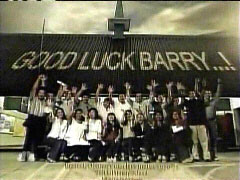 Wright bites, but the
networks didn’t see the story as a top story. The next evening’s NBC
Nightly News allocated a mere 22 seconds to Obama’s condemnation of
what fill-in anchor Ann Curry vaguely described as ‘’inflammatory
remarks that his long time pastor made about Hillary Clinton and the
nation." NBC then devoted three minutes to a celebratory piece about how
excited Obama’s childhood friends in Indonesia are about his candidacy,
a story which began and ended with a picture of Obama’s classmates in
front of huge "Good Luck Barry!" lettering.
Wright bites, but the
networks didn’t see the story as a top story. The next evening’s NBC
Nightly News allocated a mere 22 seconds to Obama’s condemnation of
what fill-in anchor Ann Curry vaguely described as ‘’inflammatory
remarks that his long time pastor made about Hillary Clinton and the
nation." NBC then devoted three minutes to a celebratory piece about how
excited Obama’s childhood friends in Indonesia are about his candidacy,
a story which began and ended with a picture of Obama’s classmates in
front of huge "Good Luck Barry!" lettering. 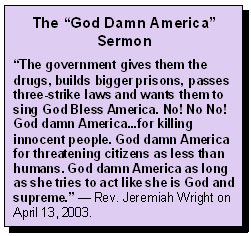 The
morning shows carried almost five minutes of Wright clips (297 seconds),
with ABC (whose first story ran 70 seconds of Wright snippets) offering
the most at 128 seconds. The other two networks each ran less than 90
seconds (CBS 82, NBC 87). Versions of Wright’s 2003 "God damn America"
remarks were the most common snippet (although often the soundbite was
clipped to only four seconds long). It appeared five times on the Big
Three evening shows, and thirteen times on the morning shows in March.
Wright yelled that black criminals were victimized by America [see box].
The
morning shows carried almost five minutes of Wright clips (297 seconds),
with ABC (whose first story ran 70 seconds of Wright snippets) offering
the most at 128 seconds. The other two networks each ran less than 90
seconds (CBS 82, NBC 87). Versions of Wright’s 2003 "God damn America"
remarks were the most common snippet (although often the soundbite was
clipped to only four seconds long). It appeared five times on the Big
Three evening shows, and thirteen times on the morning shows in March.
Wright yelled that black criminals were victimized by America [see box].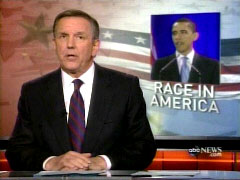 The coverage was not just heavy, but glowing. The speech was
introduced as historic. On ABC’s World News, anchorman Charles
Gibson declared "It may turn out to be the seminal speech of his
presidential campaign....an extraordinary speech." The anchors allowed
Obama to play media critic. Gibson added: "Obama complained about the
endless loop of snippets from Pastor Wright’s sermons, which have been
broadcast over and over." Gibson didn’t see a need to fact-check Obama,
at least in terms of the networks’ very limited appetite for Wright
snippets.
The coverage was not just heavy, but glowing. The speech was
introduced as historic. On ABC’s World News, anchorman Charles
Gibson declared "It may turn out to be the seminal speech of his
presidential campaign....an extraordinary speech." The anchors allowed
Obama to play media critic. Gibson added: "Obama complained about the
endless loop of snippets from Pastor Wright’s sermons, which have been
broadcast over and over." Gibson didn’t see a need to fact-check Obama,
at least in terms of the networks’ very limited appetite for Wright
snippets. On
the March 18 Evening News, Couric offered Debra Dickerson of
Mother Jones, religious-left organizer Jim Wallis, and CBS’s Jeff
Greenfield. Dickerson said Obama was "brilliant." Wallis said Wright’s
career had been unfairly "boiled down to four angry soundbites." He also
declared "The black pulpit is a place of truth-telling about the
experience of black people," an odd quote when applied to AIDS
conspiracy theories. That might explain Greenfield’s subsequent
condemnation of the Wright government-genocide comments.
On
the March 18 Evening News, Couric offered Debra Dickerson of
Mother Jones, religious-left organizer Jim Wallis, and CBS’s Jeff
Greenfield. Dickerson said Obama was "brilliant." Wallis said Wright’s
career had been unfairly "boiled down to four angry soundbites." He also
declared "The black pulpit is a place of truth-telling about the
experience of black people," an odd quote when applied to AIDS
conspiracy theories. That might explain Greenfield’s subsequent
condemnation of the Wright government-genocide comments. 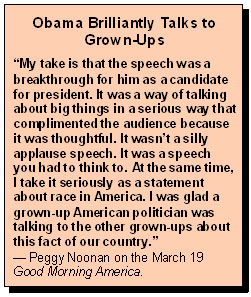 On
the March 19 Good Morning America, columnist and former GOP
speechwriter Peggy Noonan showered Obama with praise [see box].
Surprisingly, NPR correspondent Juan Williams was more critical than the
former Reagan staffer. While he acknowledged it was a good speech, he
noted the Obama campaign was in crisis "over the statements made by
Reverend Wright damning America, suggesting that the government spreads
AIDS among black people. Really outrageous statements, that initially,
you know, he [Obama] said he wasn’t in the pews. Yesterday he said, you
know, I did hear some of these statements, to be honest with you." He
said "I don’t think the Reagan Democrats...they’re gonna buy this as him
disowning himself sufficiently from the kind of rantings of Reverend
Wright."
On
the March 19 Good Morning America, columnist and former GOP
speechwriter Peggy Noonan showered Obama with praise [see box].
Surprisingly, NPR correspondent Juan Williams was more critical than the
former Reagan staffer. While he acknowledged it was a good speech, he
noted the Obama campaign was in crisis "over the statements made by
Reverend Wright damning America, suggesting that the government spreads
AIDS among black people. Really outrageous statements, that initially,
you know, he [Obama] said he wasn’t in the pews. Yesterday he said, you
know, I did hear some of these statements, to be honest with you." He
said "I don’t think the Reagan Democrats...they’re gonna buy this as him
disowning himself sufficiently from the kind of rantings of Reverend
Wright."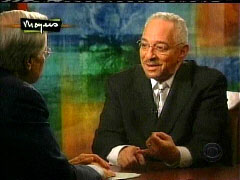 While the networks tried to drop the Wright story (and certainly the
Wright soundbites) out of the campaign narrative, Rev. Wright failed to
cooperate. After weeks of traveling out of the country to let the story
cool, Wright accepted several prominent invitations to comment on the
last weekend of April: a Friday night interview with Bill Moyers on PBS,
a Sunday night address before the Detroit chapter of the NAACP, and most
prominently, a Monday morning discussion at the National Press Club in
Washington.
While the networks tried to drop the Wright story (and certainly the
Wright soundbites) out of the campaign narrative, Rev. Wright failed to
cooperate. After weeks of traveling out of the country to let the story
cool, Wright accepted several prominent invitations to comment on the
last weekend of April: a Friday night interview with Bill Moyers on PBS,
a Sunday night address before the Detroit chapter of the NAACP, and most
prominently, a Monday morning discussion at the National Press Club in
Washington. 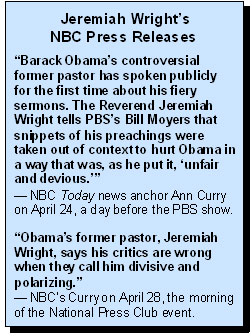 While
reporters acknowledged Wright’s high-profile tour wouldn’t be good news
for Obama’s campaign, these network stories offered no soundbite time
for rebuttals from Wright’s critics. No conservative was allowed to
question the merits (or lack of merits) of the minister’s complaints to
Moyers, or that it was bizarre for him to suggest that his sermons were
not defined by America-bashing, and not full of bitterness and hate.
While
reporters acknowledged Wright’s high-profile tour wouldn’t be good news
for Obama’s campaign, these network stories offered no soundbite time
for rebuttals from Wright’s critics. No conservative was allowed to
question the merits (or lack of merits) of the minister’s complaints to
Moyers, or that it was bizarre for him to suggest that his sermons were
not defined by America-bashing, and not full of bitterness and hate. 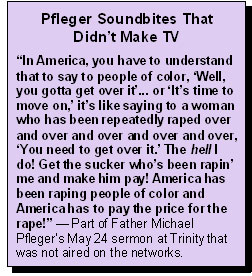 The
story originated again on YouTube, not the networks. Days later, all
three networks covered the story on May 30. Once again, it was
newsworthy within a Democratic Party context, since it caused Obama a
headache within his own party, complicating his attempts to wrap up the
race against Mrs. Clinton and start working on winning over her
supporters.
The
story originated again on YouTube, not the networks. Days later, all
three networks covered the story on May 30. Once again, it was
newsworthy within a Democratic Party context, since it caused Obama a
headache within his own party, complicating his attempts to wrap up the
race against Mrs. Clinton and start working on winning over her
supporters. 